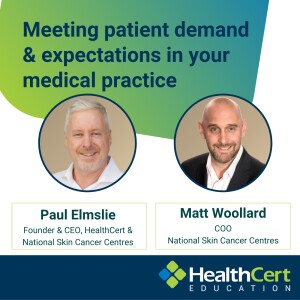Episodes

Friday Apr 14, 2023
Meeting patient demand & expectations in your medical practice
Friday Apr 14, 2023
Friday Apr 14, 2023
How can you keep up with patient demand in your medical practice and better meet your patients’ expectations? In this latest podcast, Paul Elmslie (Founder & CEO, HealthCert Education and National Skin Cancer Centres) and Matt Woollard (COO, National Skin Cancer Centres) give their practical advice for keeping up with patient demand and changing perceptions and preferences, based on their own experiences owning and operating 40+ general practices and skin cancer clinics in Australia.
In this episode of HealthCert’s GP Insights podcast, Paul Elmslie and Matt Woollard talk about how you can keep up with patient demand and changing perceptions and expectations in your medical practice. The recent CommBank Health GP Insights Report 2023 highlighted interesting trends about the current and emerging landscape for medical practices in 2023 and beyond. This podcast is part 3 of 3 episodes focusing on relevant findings in that report. Paul and Matt have owned and operated 40+ medical clinics in Australia over the past few decades, and here they discuss some of what they have learned.
Keeping up with patient demand
In the podcast, Matt says, “Without realistically increasing the number of doctor hours you have in your practice, the only way to keep up with increased patient demand is through workplace efficiencies or changing your workflow to allow you to be able to treat or manage more patients in the same amount of time without putting patient safety at risk.
“A nurse can help increase the doctor’s productivity. You might work with a nurse and a tag-team environment where you triage patients and work across maybe two or three different consultation rooms.
“You might also look at what tasks a doctor is doing that could be moved on to a nurse. I think there’s a lot of opportunities inside general practice to really streamline how a general practice runs so that a practice can keep up with demand without increasing the number of doctors they have for that demand.”
Optimising practice productivity
Utilising availably technologies is a great way to minimise the amount of “human work” required from your clinic, thereby reducing workload, speeding up workflow, and optimising efficiency. An example of this includes using online booking systems, as more patients doing online bookings equals less phone calls at the front desk, allowing the staff to focus on serving the patients that are in front of them.
Another example is online registration forms so that patients can complete their personal information before they even arrive at the practice for their appointment. In addition, there is software available that can automatically send patients’ results to them so that they don’t need to be recalled back into the clinic to get their results.
Matt suggests that doctors should sit down and look at the tasks they are doing every day “that are a waste of your training and experience” that could be done by somebody else so that the doctor is freed up to spend more time seeing patients. It’s also important to ask whether any steps could be cut out of a process to make it faster.
Managing patients’ changing perceptions and expectations
In the second half of the podcast, Paul and Matt take an in-depth look at some of the most common patient expectations that medical clinics should strive to meet in order to satisfy their patients’ changing needs and wants. They also discuss the impact of social media and Google reviews and how patients’ experiences influence their word-of-mouth referrals and public feedback, and much more.


No comments yet. Be the first to say something!